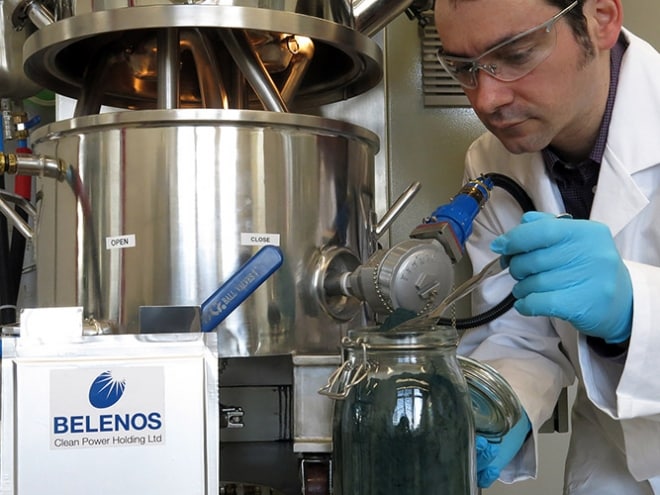A revolutionary battery by Belenos

The watchmaker Swatch Group has signed an agreement with the Chinese Geely Group for use of its innovative new battery.
© NZZ am Sonntag (original text in German).
For six years, Belenos, a Swatch Group research company, and ETH Zurich have been developing a new and innovative battery that aims to be at least 30% more powerful than conventional counterparts. The company can now report its first success: in mid-May, Belenos and the Chinese car and motorcycle manufacturer Geely signed a joint declaration of intent for use of the new battery technology.
“We are therefore giving Geely the opportunity to use our revolutionary battery system,” says Nick Hayek, CEO of Swatch Group, in an interview in Biel. In the cooperation, Geely and Belenos want to obtain concrete experiences with the use of the battery system in vehicles. “It is a first breakthrough for our invention, and reflects the great interest the industry has in our development,” says Nick Hayek. The cooperation with the ambitious car manufacturer aims to adapt the battery architecture optimally for its intended use.
Joint production of the revolutionary battery in China could also start as early as 2017, with the technology and powder for the cathode being provided by Belenos. The battery developed in Switzerland is already protected by 20 patents. The ultimate goal is now to obtain certification of the battery for use in electric vehicles on Chinese roads.
Representatives of Geely became aware of the Belenos invention when Nick Hayek reported on the development of the new type of battery in 2015 in an interview with a Chinese TV broadcaster. In January 2016, a delegation from Geely visited Switzerland to look at the technology and production facilities there. In April, Hayek travelled to Geely's head office in Hangzhou, around 190 km southwest of Shanghai, met the executive management and visited the factories. The “Memorandum of Understanding” signed two weeks ago defines a clear division of tasks between Belenos and Geely and comprises a detailed plan for their future cooperation. For both parties, the next steps will depend on the results achieved.
The name Geely, which means “luck” in English, can gain an edge over its competition by using the Belenos battery: it is not, as is usually the case, based on lithium, which is becoming more and more expensive, but on a particular compound of vanadium, which is available in large quantities and can be recycled without difficulty. With the same weight, an electric car with the vanadium battery achieves a 30% greater range than with the conventional battery model. The Swiss battery can also be charged much more quickly.
While Swatch Group is still the largest watchmaking group in the world, manufacturers of luxury goods currently find themselves in a cyclical downward trend. The key markets of China and Hong Kong are shrinking, tourists from China are no longer travelling to Europe in the same numbers, exports to Russia have fallen sharply and the high growth figures are also over for now in the USA. In response, Swatch Group CEO Hayek is now strengthening the industrial side of the Group and is aiming to launch a more powerful battery ready for series production ahead of foreign competition.
The battery is the combustion engine of the 21st century – and its potential in the Far East is particularly high: in the past year, 331,000 electric cars were sold in China, far more than in the USA, which was previously the largest e-mobile market. The Chinese government supports the spread of electric cars with subsidies and tax breaks. The emission-free vehicles should help to reduce the severe smog in the cities.
At the same time, China wants to promote the establishment of a globally competitive car industry that will earn money through the export of electric cars. By 2020, Geely wants to fit around 90% of its models with an electric motor, and in four years, it aims for a third of its cars to be electric only. In terms of volumes, Geely would thus far surpass pioneer Tesla. “By 2020, there will be millions of electric cars on China's roads,” claims Hayek.
The Zhejiang Geely Holding, founded in 1997 in Hangzhou, is already successful outside China: It took over the Swedish Volvo Car Group in 2010 and the insolvent London Taxi Company in Coventry in 2013. Geely has just acquired $400 million to build a new factory in which an electric version of the classic London taxi cab is to be produced. The future is also electric at Volvo: By 2025, the Swedish company aims to sell one million battery-driven vehicles. Geely has control of the entire value chain in car construction, from research, development and design through to production. The leading non-state-run car manufacturer in China employs more than 47,000 people and last year sold more than 1 million vehicles, around 500,000 of which were Volvos.
In addition to cars, Geely makes around 600,000 motorcycles and scooters per year, some with an electric drive. The Geely Automobile shares are listed on the Hong Kong stock exchange. Despite the economic cool-down in China, Geely was able to increase sales last year by 22% to more than 510,000 vehicles; in the current year, 600,000 cars are forecast to be sold.
The technology of the innovative battery is used not least by Swatch Group itself: In the Group's battery factory Renata in Itingen (BL), the first flexible assembly line for small batteries of the new type will start up at the end of September. These button batteries are not only built into watches, but also a wide range of other electric devices such as hearing aids. The assembly line will enable a wide range of larger batteries to be produced as well.
These efficient batteries can also be used in drones, e-bikes or e-scooters. Swatch Group will probably enter into selected partnerships in each of these areas. In Switzerland, projects for concrete applications are already under way.
Read more on www.belenoscleanpower.com